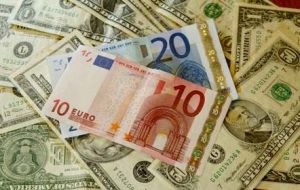MercoPress. South Atlantic News Agency
July inflation in US and Euro Zone remained stable

The United States Federal Reserve's preferred inflation guide grew less than expected in July, increasing the possibility of a cut in US interest rates next month.
Core US consumer prices, which exclude food and energy costs, rose by 0.1% in July, compared with market expectations of a 0.2% expansion. Analysts said the 0.1% figure should give the Fed the room to lower rates to help ease the current market turmoil. Following July's 0.1% rise, the Commerce Department said the annual level of consumer price inflation was 1.9%, well below where it stood earlier this year. It is also within the Fed's unofficial 1% to 2% comfort zone. The base US interest rate is currently set at 5.25%, where it has been for more than a year. A number of analysts now expect the Fed to make a cut to 5% at its next rate-setting meeting on 18 September. Such a reduction would help ease the current credit squeeze in the financial sector centered on a slump in the sub-prime mortgage industry. With banks and other financial institutions unwilling to lend money until the full extent of the sub-prime slump is known, the interest they charge on loans in general has increased. A rate cut from the Fed would give them both the scope and the confidence to reduce their own interest levels. Separate figures also released on Friday by the Commerce Department showed that US consume spending grew 0.4% in July and personal incomes by 0.5%. Both were above market expectations of 0.3% in each case Meanwhile in the Euro zone inflation in August was stable in line with the European Central Bank's target for the 12th straight month, but consumer expectations of inflation jumped and economic sentiment weakened more than expected, official data showed. European Union statistics office Eurostat estimated that consumer prices in the 13 countries using the Euro rose 1.8% year-on-year in August, the same as in July and in line with market expectations. The ECB wants to keep inflation below but close to 2%. Price growth has been at that target since September 2006. But a monthly European Commission survey showed inflation expectations 12 months ahead, a factor the ECB watches closely in policy decisions, surged to 26 points in August from 19 in July, the first increase in nine months. Producer inflation expectations remained stable at 13. Markets expect the bank will refrain from an interest rate rise earlier signaled for September 6 so as not to further damage sentiment after market turmoil and problems at some German banks in the wake of the U.S. sub-prime mortgage crisis.




Top Comments
Disclaimer & comment rulesCommenting for this story is now closed.
If you have a Facebook account, become a fan and comment on our Facebook Page!